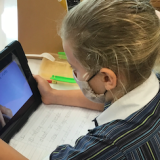Becoming A Mathematician – The AIS Approach
Many of us will remember struggling with Maths at school – trying to figure out the meaning of Pythagoras theorem while our heads were spinning with algebra, fractions and long division. Rote learning was a common practice, and we were often expected to memorise long sequences of times tables without really understanding why or how the calculations worked. The Australian International School’s Assistant Head of Elementary and Mathematics expert Lucas McKay, explains how this approach to learning is a thing of the past, and how the Australian International School has found a way to make Maths accessible and enjoyable for every child…
Why Is Maths Important?
Whether managing finances, watching the news, shopping, or in the workplace, Maths skills are a hugely important part of everyday life. Maths is essentially about problem solving, and good problem-solvers will excel in almost any situation. In the modern world, despite the advancements in technology, there is not a single profession that doesn’t require some form of basic maths skills. Whether you’re a CEO or a shop assistant, the ability to carry out simple arithmetic is a must if you are to succeed at doing your job. And it’s not only number skills where Maths comes into play – logical thinking and the ability to approach a problem from different angles are essential interpersonal skills which impact how we communicate and form relationships, both in the workplace and in our personal lives.
How Does AIS Approach Teaching Maths In The Elementary School?
At AIS, our focus is on developing number sense, ensuring that students actually make sense of the numbers and understand not just the what by the why. If we tell a student over and over again that two times two equals four, they will eventually memorise this information, but they will never really understand why two times two equals four. Research has shown that learning through rote and repetition is not effective and turns students off maths, especially girls. It works on the assumption that every student learns in the same way, however we know that each and every child is different so we tailor our approach accordingly. We focus on the different learner profiles within the classroom – developing risk-takers, reflective and open-minded learners, communicators and thinkers. The student voice is valued as a key part of the learning process, and we will always present a selection of problem solving methods so students can choose the one which best suits their learning style.
How Can Parents Support Their Children With Maths At Home?
It is important for parents to focus on process and strategy (eg. How could we solve this? Could we try it another way?) rather than simply looking for the right answer as quickly as possible. Forcing children to work quickly on maths will make them feel anxious and under pressure and is the best way to develop a fear of Maths.
Parents should be positive – reinforce what is being done well, and don’t dwell on what has been done wrong. Explore different ways of bringing Maths into your daily home routine – puzzles and dice games are fun and can be great for developing number sense. You can also try solving problems in context – whether out for lunch, watching sport or cooking dinner, look for real situations that present mathematical problems and encourage your child to solve them.






